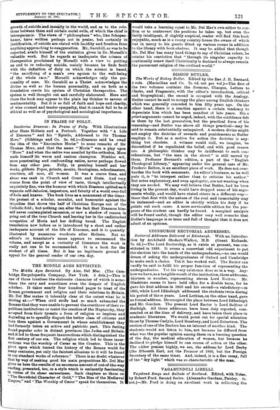IN PRAISE OF FOLLY.
Desiderius Erasmus : In Praise of Folly. With Illustrations after Hans Holbein and a Portrait. Together with "A Life of Erasmus" and his "Epistle, Addressed to Sir Thomas More." (Gibbiugs and Co. 2s. 6d.)—Erasmus said he owed the idea of the "Encomium Moshe" to some remarks of Sir Thomas More, and that the name " Moria " was a play upon "More." And when the satire was assailed bythe orthodox, More made himself its warm and zealous champion. Nimbler wit, more penetrating and confounding satire, never perhaps flowed from any other pen. Folly, in praising herself and her works, gibbets Popes, priests, monks, theologians, schoolmasters, courtiers, all men, all women. It was a coarse time, and abuse was rank in Church and Court and State. And very coarse from the point of view of taste, though intellectually exquisitely.fine, was the humour with which Erasmus spitted each separate self-delusion, imposture, and fatuity of a world over-full of fools and knaves. The book lives as a monument of the times : the protest of a scholar, moralist, and humourist against the iniquities that drove -the half of Christian Europe out of the Catholic fold ; but nothing can alter the fact that Erasmus him- self never contemplated secession, or saw a shadow of reason in going out of the true Church and leaving her in the undisturbed occupation of Mona and her defiling brood. The English translation now before us is introduced by a short and rather inadequate account of the life of Erasmus, and it is quaintly illustrated by numerous woodcuts after Holbein. But no editor's or translator's name appears to recommend the volume, and except as a curiosity of literature the work is really not one to be recommended. It is a book for the student of all times. But it has no legitimate ground of appeal for the general reader of our own day.


















































 Previous page
Previous page